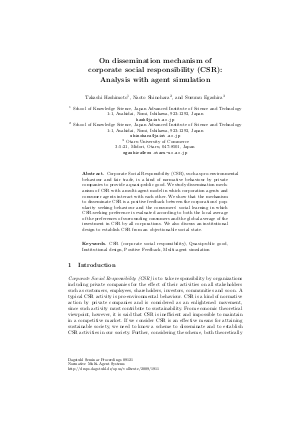On dissemination mechanism of corporate social responsibility (CSR): Analysis with agent simulation
Authors Takashi Hashimoto, Naoto Shinohara, Susumu Egashira
-
Part of:
Volume:
Dagstuhl Seminar Proceedings, Volume 9121
Part of: Series: Dagstuhl Seminar Proceedings (DagSemProc) - License:
 Creative Commons Attribution 4.0 International license
Creative Commons Attribution 4.0 International license
- Publication Date: 2009-03-11
File

PDF
DagSemProc.09121.24.pdf
- Filesize: 249 kB
- 11 pages
Document Identifiers
Subject Classification
Keywords
- CSR (corporate social responsibility)
- Quasi-public good
- Institutional design
- Positive Feedback
- Multi-agent simulation
Metrics
- Access Statistics
-
Total Accesses (updated on a weekly basis)
0Document
0Metadata
Abstract
Corporate Social Responsibility (CSR), such as pro-environmental behaviour and fair trade, is a kind of normative behaviour by private companies to provide a quasi-public good. We study dissemination mechanism of CSR with a multi-agent model in which corporation agents and consumer agents interact with each other. We show that the mechanism to disseminate CSR is a positive feedback between the corporations' popularity seeking behaviour and the consumers' social learning in which CSR-seeking preference is evaluated according to both the local average of the preferences of surrounding consumers and the global average of the investment in CSR by all corporations. We also discuss an institutional design to establish CSR from an objectionable social state.
Cite As Get BibTex
Takashi Hashimoto, Naoto Shinohara, and Susumu Egashira. On dissemination mechanism of corporate social responsibility (CSR): Analysis with agent simulation. In Normative Multi-Agent Systems. Dagstuhl Seminar Proceedings, Volume 9121, pp. 1-11, Schloss Dagstuhl – Leibniz-Zentrum für Informatik (2009)
https://doi.org/10.4230/DagSemProc.09121.24
BibTex
@InProceedings{hashimoto_et_al:DagSemProc.09121.24,
author = {Hashimoto, Takashi and Shinohara, Naoto and Egashira, Susumu},
title = {{On dissemination mechanism of corporate social responsibility (CSR): Analysis with agent simulation}},
booktitle = {Normative Multi-Agent Systems},
pages = {1--11},
series = {Dagstuhl Seminar Proceedings (DagSemProc)},
ISSN = {1862-4405},
year = {2009},
volume = {9121},
editor = {Guido Boella and Pablo Noriega and Gabriella Pigozzi and Harko Verhagen},
publisher = {Schloss Dagstuhl -- Leibniz-Zentrum f{\"u}r Informatik},
address = {Dagstuhl, Germany},
URL = {https://drops.dagstuhl.de/entities/document/10.4230/DagSemProc.09121.24},
URN = {urn:nbn:de:0030-drops-19114},
doi = {10.4230/DagSemProc.09121.24},
annote = {Keywords: CSR (corporate social responsibility), Quasi-public good, Institutional design, Positive Feedback, Multi-agent simulation}
}
